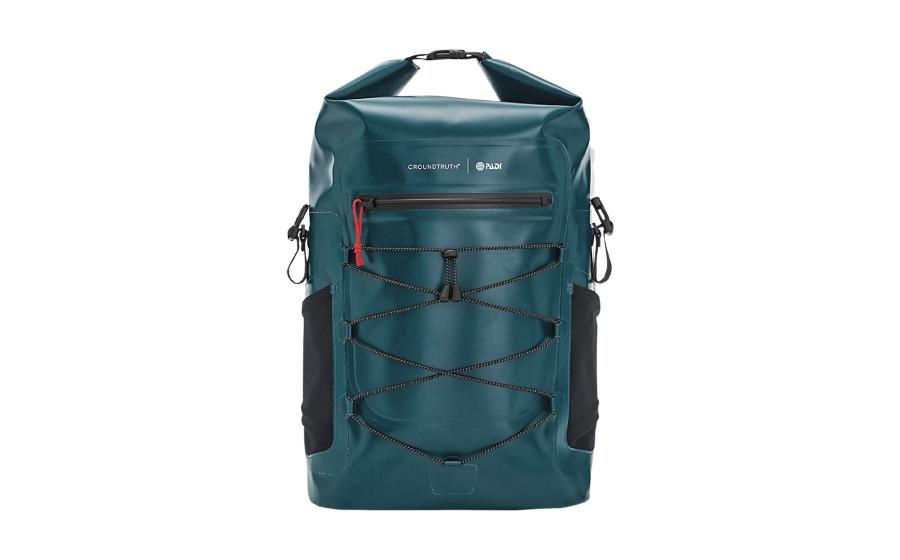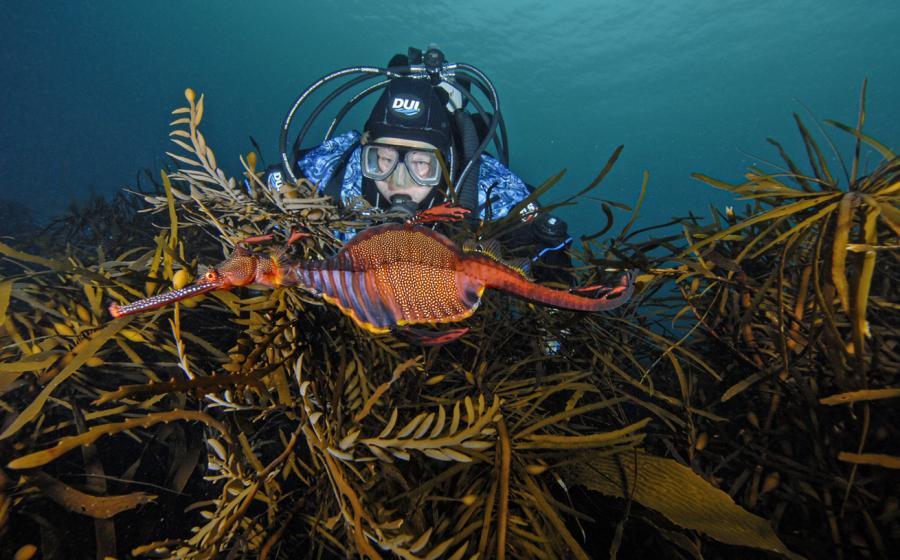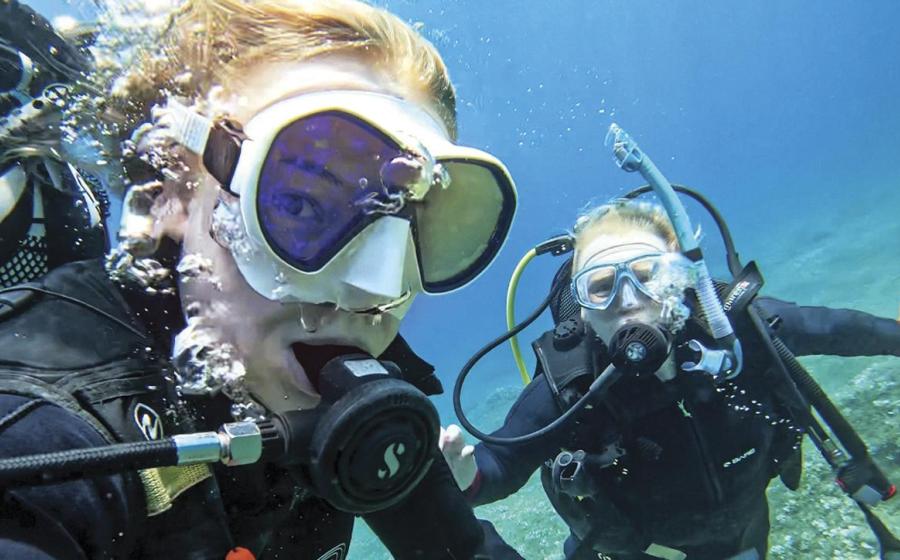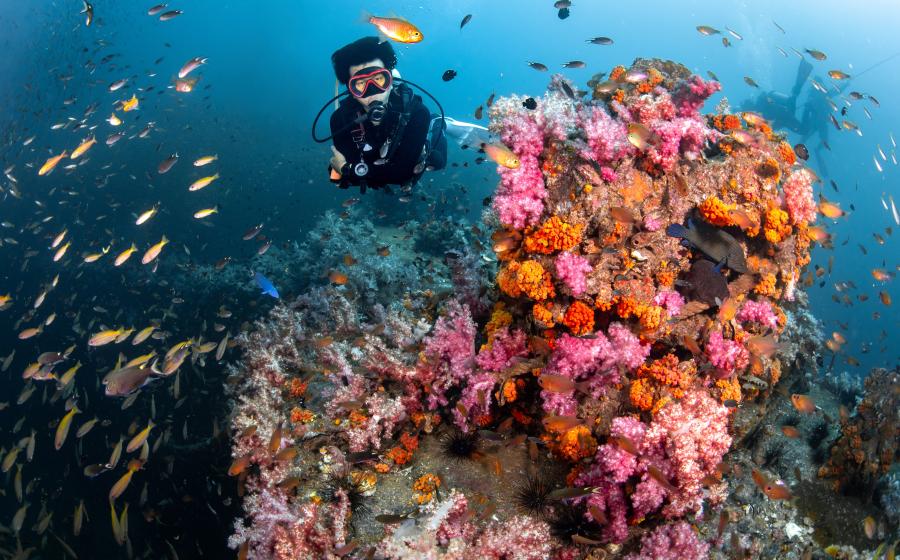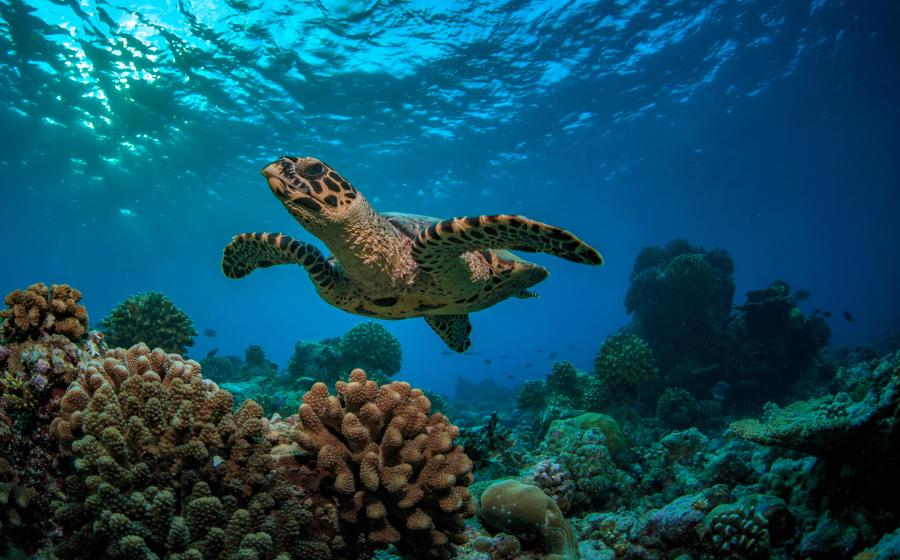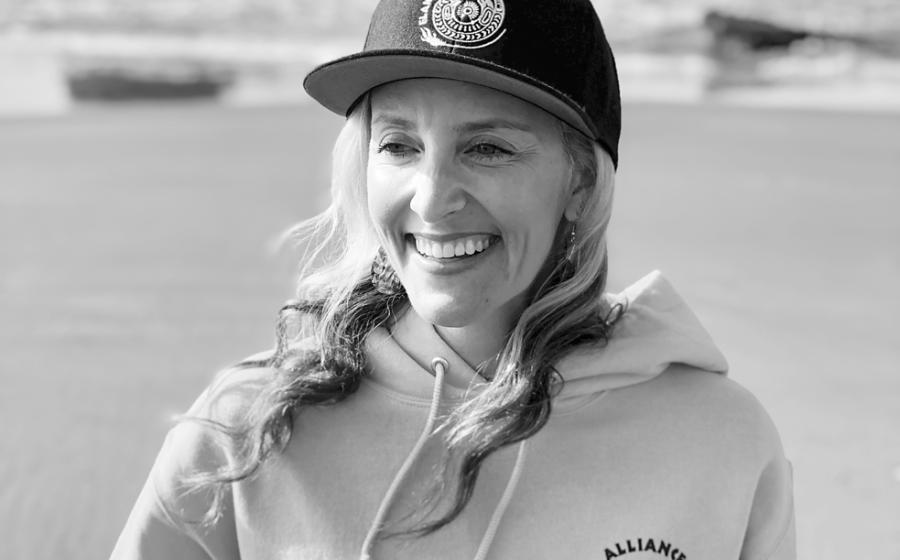Bait and Switch

By Eric Douglaswww.booksbyeric.com
Author of Cayman Cowboys and Flooding Hollywood
Sponsored by Scuba Diving Magazine and ScubaDiving.com
||
|---|
| About the Author|
| Eric Douglas' books: Flooding Hollywood & Cayman Cowboys |
|

|
| Eric Douglas began diving in 1990 in West Virginia . He became a dive instructor in 1998 while working for the world's largest dive training organization, the Professional Association of Diving Instructors (PADI) in Rancho Santa Margarita, California . There he helped develop training materials and served as the Assistant Editor of The Undersea Journal , a publication read by more than 150,000 professional divers worldwide.He is currently the Director of Training for Divers Alert Network (DAN), an international scuba diving safety organization where he develops dive safety training programs. He also frequently teaches those programs to dive instructors and instructor trainers so they can teach them to divers.Trained as a journalist, with a degree from Marshall University, he has written thousands of stories and has traveled the world with his cameras in hand. Eric currently lives in Durham, North Carolina, the home of Duke University and DAN, with his wife, two daughters and three dogs.|
"I don't mind telling you guys, I thought I was going to be bored, but I think I'm actually starting to relax," the first angler said. "I think my body is finally beginning to slow down."
"I thought you'd like it. That's why I keep coming back to this little island. Withrow Key is quiet and that's the way I like it. You get divers and guys coming out fishing, but that's about it. Not all the hassles with the tourists going down to Key West or the crowds that only make it down to the northern keys," the second man replied. He leaned back in his fishing chair on the deck of his Hatteras-style fishing boat, the No Account - so named because of his career in banking, and it was what his ex-wife said about him during the divorce hearing.
"So, who needs a beer?" asked the third man as he came out into the bright Florida sun from the enclosed cabin. "You guys can fish all you want, but I just want to lie in the sun and drink my fill." Two hands shot up and the third man disappeared back into the cabin to fetch the drinks.
For the three men, it was an opportunity to get away from their busy lives. None of them could spare the time to take a long vacation, but the little island in the middle of the Florida Keys was close enough that they could take off from their Miami homes and businesses and spend a couple days on the water, relaxing before they had to jump back into the fray of their high pressure world. It was quiet out on the water and that was the way they all liked it. One was in pharmaceutical sales, another in banking and a third worked for the company that managed the port of Miami. All were divorced, but none were interested in getting into another relationship. They didn't have to report their whereabouts to anyone else and they all liked it that way.
"What's that noise?" the third businessman asked as he came outside, holding the open refreshments.
"Probably a small plane or a helicopter," replied the second man, who actually owned the boat and was the most experienced on the water. "You get private planes coming across the water from the islands from time to time. Some of these pilots like to fly low to pretend they're smuggling drugs or something, I guess."
"Why do you say 'pretend they are smuggling drugs'?" the first man questioned, as he scanned the sky around the boat. He felt vaguely uneasy about being disturbed; all the more so, because they were totally alone on the water. They had found a spot on the open water, near a drop-off in the reef that provided a good location to fish, but one where most of the hard-core fishermen avoided.
"Oh, I guess they could be smuggling drugs, but they don't normally make those flights during the day. Too easy to be spotted. Also, the government has done a pretty good job of shutting down the landing strips around here. There are easier, more profitable ways to smuggle pot or coke up into the US," he explained.
"Oh yeah, I saw that bit on the news about that tunnel out west underneath the border. That has got to be easier than dealing with a plane and all that," the third man replied. "Wait a minute; I think I see the plane. Boy, those guys are flying just over the wave tops," he continued, pointing just off the port bow of the fishing boat.
The other two men stood to look at the oncoming airplane. The plane appeared to be coming straight at them. All they could make out was the nose of the plane, two thin wings and two perfect circles for the engines, spaced halfway out from the body. They couldn't make out even the slightest hint of the side of the fuselage that would indicate that the plane was going to pass to one side or the other. The aircraft was moving so fast and so low to the water, the air forced over the wings by the props kicked up a spray, making the plane look like a jet with an enormous contrail following behind. In unison, the three men instinctively looked for floats on the bottom, making sure the plane wasn't going to make a water landing. They came up empty.
They realized the plane was low enough to damage their boat, even if it didn't actually hit the flying bridge of the fishing boat that rose more than 20 feet from the water line. Two of the fishermen ran to the bow to signal the plane. They grabbed life vests and waived them furiously in the air. The boat's owner ran to the pilot house and grabbed his radio. The plane was coming closer and he needed to do something. Unfortunately, boats and airplanes operate on different radio frequencies, so there wasn't much he could do to warn the plane away. The fisherman immediately called the coast guard for help.
"How much longer?" the Latino man in the back of the aging DC-3 asked the pilots as he stuck his head through the cockpit door. He was nervous about what the three of them were doing, and even more so because he had absolutely no control over the current situation. He had set it all up and planned it all out, but he wasn't a pilot. For this part of the job he had to trust others and that didn't come easy.
"The good news is we're almost there. The bad news is, if you startle me like that again, we'll never make it," the pilot said without turning his head. It took every ounce of energy the man had to focus on the job in front of him. The plane was so close to the water, one sloppy turn or the slightest twitch of his hand could send the plane, all three men and the cargo into the water.
In its heyday, the DC-3 was the pride of commercial aviation. Still in flight 60 years after it rolled off the assembly line from the plant in Long Beach, California the aircraft had seen better days. Over the years, it had changed hands several times. The plane eventually ended up in South America, transporting everything from guns for rebels to bibles for missionaries - occasionally at the same time. The current owners tried to keep it airworthy, but the plane had recently changed hands in a card game and the maintenance records hadn't been included. That was the joke the pilot made, anyway, knowing full well it hadn't seen a qualified mechanic in a long time.
"All right, all right, I'll leave you to it, but let me know what's going on," the man in the rear said as he moved back to his seat.
"When this job is over, I'm going to get out of this business. I'm too old for this," the pilot said, out loud, but not really expecting a reply from his co-pilot. He received a grunt from the other man in response. For the man in the right-hand seat, that was practically a conversation. The co-pilot wasn't given to idle chatter; he barely spoke at all, except what he had to say as part of his duties. The two men had been flying together for three years, but the pilot barely knew anything about the other man, except that he was a good and stable pilot, reliable and smooth. That was all that really mattered. In their line of work, it paid to keep to oneself.
The pilot, Roy Barnes, was in his mid-50s. At one time he was an up and comer, flying for the Central Intelligence Agency. He was young and sharp with bright blue eyes and sandy brown hair. But that was 25 years ago. After leaving the CIA, he stayed in South America, flying for whoever would take him on. The lure of the drugs that were everywhere in the 1980s had been too strong and the very thing he had worked by day to destroy, ended up destroying him. Today, he was simply a shell of himself. Friends from back in the day probably wouldn't have recognized him - tired and worn, underweight with a receding hairline and a two-day stubble shrouding his face. But, people remarked, he still had those eyes. He could also handle just about any plane in the air.
His quiet co-pilot was almost the exact physical opposite of Barnes. Al Reynolds was tall, with a beefy frame and a thick shock of gray hair on his head. He hadn't shaved in several days either, but that was unusual for him. Not that the two men had ever spoken about it, but they had similar flying backgrounds - they both worked for "the Agency". Reynolds was known for being cool under fire and never really changed his expression when he was in the cockpit of an aircraft.
That quiet, calm, collected approach was what made it all the more surprising when the man in the second seat suddenly shouted, and then pulled back on his yoke to bring the plane off the deck. Not realizing what was going on, Barnes wasted precious time looking at Reynolds before he looked back through the windshield in front of him and realized the problem. They had been so focused on flying at the wave tops they had failed to notice the solitary fishing boat directly in their path. The DC-3's wingspan, altitude and speed made it impossible to turn the plane in time to avoid a disaster. Their only choice was to climb.
They had planned to make their approach totally unseen. A pass barely over the heads of the people on board would surely get radioed in and a fixed location reported - that wasn't going to help their plan. The long-term affects of the near miss were low on the pilot's priority list, however, as he struggled to deal with the short-term ones and force the old plane off the deck, making it rise like a fighter plane rather than a cargo hauler.
For a moment, the two men at the controls thought they had made it and were safe. Then all hell broke loose. One odd thing about the DC-3, while the entire body of the plane was made of aluminum, the rudder and the elevators on the tail of the plane were made from an aluminum frame that was covered with canvas. The salt water spraying on the aging and dry-rotted material tore the fabric to shreds. The sudden wrenching motion by the co-pilot was more than the canvas could take. It simply disintegrated. First from the right side, then the left. The loss of control from the elevator caused the plane to lurch downward and to one side. There was nothing the two men in the front could do to stop it. They were both strapped in, which was something the man in the rear of the plane couldn't say.
The wing tip on the crippled right side met the water first, digging in and causing the plane spin like a poorly-thrown Frisbee. That sudden redirection may have saved the plane, for a minute anyway, as it caused the relic to hit the water flat, tail first, as it continued to rotate.
After a second or two -- that seemed like hours for the men in the cockpit -- the water caused the plane to slow enough that the other wing tip dipped down into the water flipping the plane on its back and suspending the pilot and the co-pilot from their harnesses. Water came rushing in.
"Are you all right?" Barnes shouted over the ear-splitting noise produced by the dying airliner and the roaring water as the ocean rushed in.
"Yeah, I think so. Can't unbuckle, though. Must be jammed," Reynolds replied.
"Hang on, I'm comin'," Barnes said as he released the catch on his harness and dropped loose from his seat into the water below. He was disoriented for just a second when he hit the water and found himself kneeling underwater on the airplane's ceiling.
Standing up, Barnes found that the water was already around his waist and the plane was sinking fast. A gaping hole ripped in the fuselage by the force of the crash was allowing the ocean to pour inside at an alarming rate.
Without another word, the pilot wiped saltwater from his eyes and grabbed the buckle on the Reynold's flight harness. It wouldn't budge. The water continued to rise, nearly covering the copilot's head. He had to twist in his seat to continue to breathe.
"I don't want to die, man, get me out of here," Reynolds shouted, nearly out of breath from fear.
"Don't worry. Today isn't your day. Not if I have anything to say about it," Barnes barked, although the terrible thought had already formed in his mind. If he couldn't get the other man out in just another second or two, he was going to have to leave him behind and swim for it or he might die as well.
Bracing his feet against the inverted console, the pilot drove his shoulder into the larger co-pilot and pressed the man against his seat -- taking the weight off the harness. With his free hand, he grabbed the buckle and jerked it open. The suddenness of the desperate move prevented Reynolds from bracing himself or holding on. His body was dead weight as he fell on top of the pilot, pushing them both underwater.
Breaking the surface of the water, the two men didn't waste time talking. Instead they both took the biggest breaths their lungs could hold and dove under the water to swim out of the wrecked airplane.
The cargo hold of the aging plane was full of bundles. It was also totally full of water. The plane was sinking quickly. Both men were confused in the topsy-turvy, jumbled compartment and were on the edge of panicking when the plane began to roll to its side. Suddenly, above them, the men could see light through the hole ripped through the aluminum skin in the side wall of the plane. It was broad daylight above and the sunlight streaming through the crystal clear water showed the two men how to find their way out. They burst out of the plane and began swimming upward. Their only thought was getting to the surface. Their bodies were desperate for air and they were both near blacking out when their heads broke the surface in unison.
Automatically, both men lay back in the water and tried to keep themselves afloat as they caught their breath. In fact, they never heard the fishing boat approach.
"Hey, are you two all right. I can't believe anyone made it out of that crash," one of the men on the fishing boat shouted out as the owner maneuvered in for a closer look. "Grab this line and we'll pull you in."
Unable to speak, the two men in the water shared a look as if to ask, "What now?" but kept quiet. They simply raised their hands and prepared to catch the rescue line.
As they neared the boat, the pilot finally found his voice.
"There was a third man on the plane. Any sign of him?" Barnes asked of the man who had set up this adventure and convinced he and Reynolds to take this risk.
"We haven't seen anyone else, and I can't believe anyone else could survive. It's got to be a miracle that you two got out," the fisherman said. "Now, don't you guys worry. I've radioed in our location and help is on the way. We'll get you taken care of."
The pilot stood on somewhat uncertain feet at the stern of the large boat after being pulled on board. Never a violent man, he still knew what he was going to have to do to protect the operation and keep himself and Reynolds out of prison for the rest of their lives. He could tell by the look in his partner's eyes, Reynolds knew it too.
| Next Page >> |
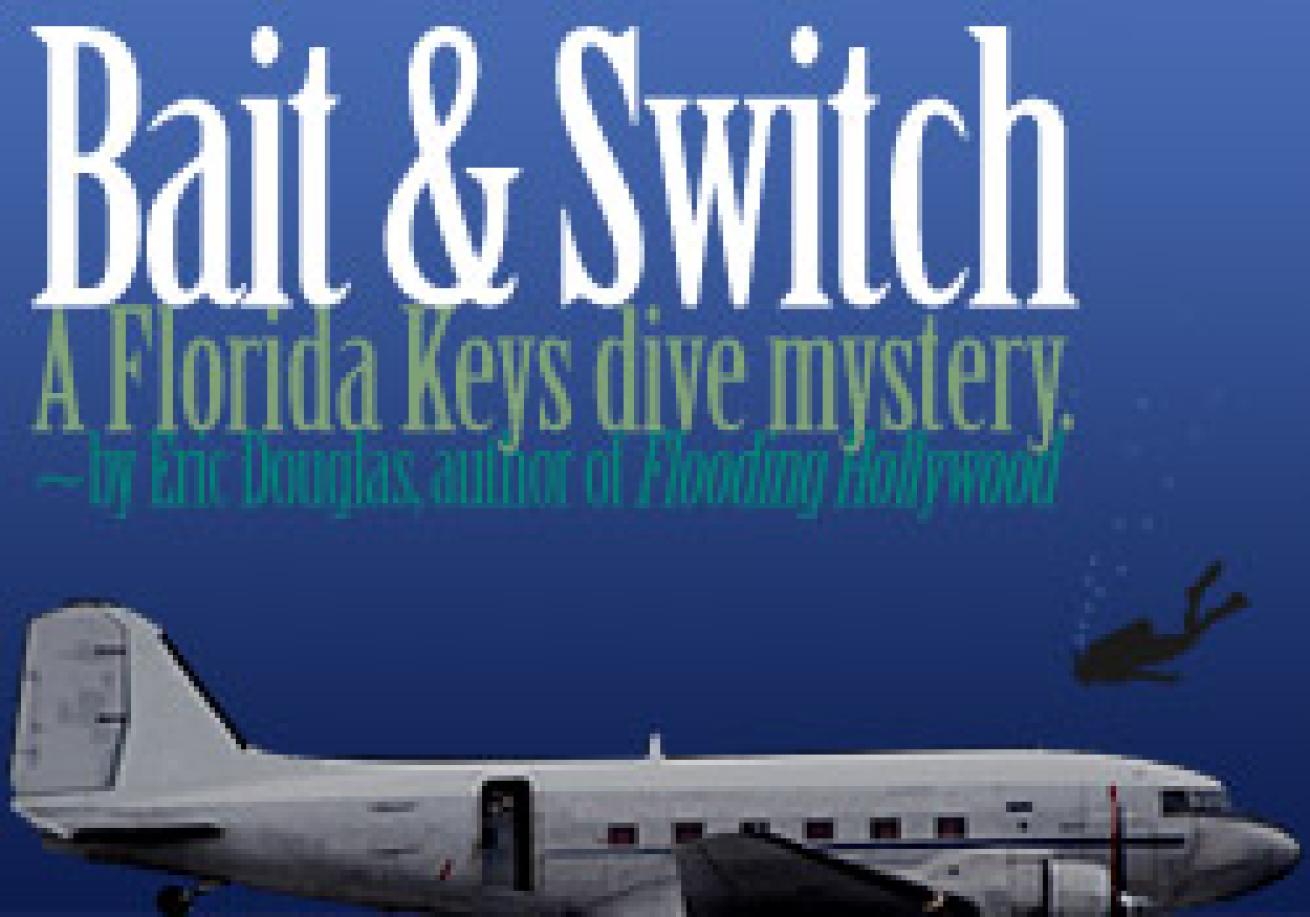
By Eric Douglas
www.booksbyeric.com
Author of Cayman Cowboys and Flooding Hollywood
Sponsored by Scuba Diving Magazine and ScubaDiving.com
About the Author Eric Douglas' books: Flooding Hollywood & Cayman Cowboys
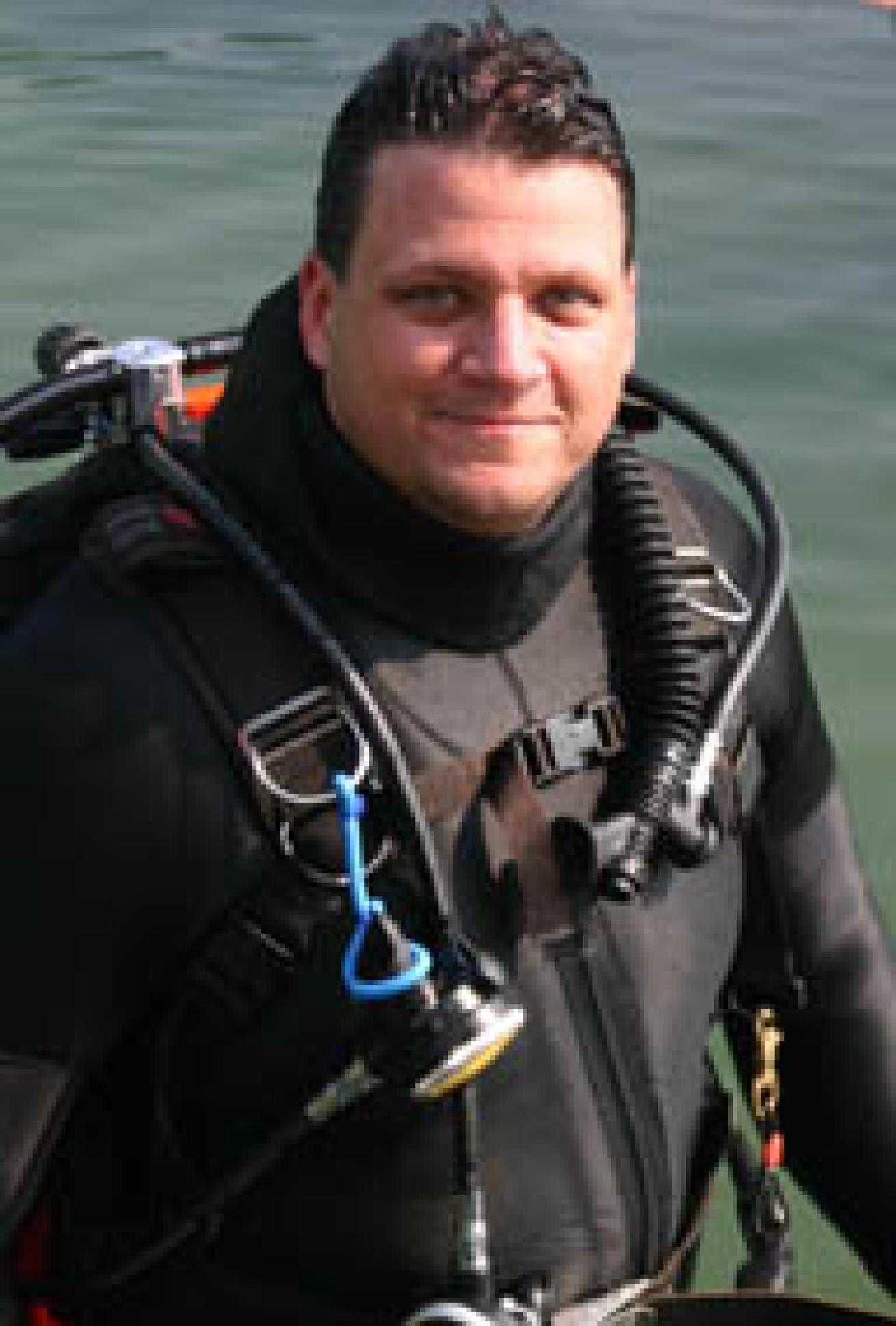
Eric Douglas began diving in 1990 in West Virginia . He became a dive instructor in 1998 while working for the world's largest dive training organization, the Professional Association of Diving Instructors (PADI) in Rancho Santa Margarita, California . There he helped develop training materials and served as the Assistant Editor of The Undersea Journal , a publication read by more than 150,000 professional divers worldwide.He is currently the Director of Training for Divers Alert Network (DAN), an international scuba diving safety organization where he develops dive safety training programs. He also frequently teaches those programs to dive instructors and instructor trainers so they can teach them to divers.Trained as a journalist, with a degree from Marshall University, he has written thousands of stories and has traveled the world with his cameras in hand. Eric currently lives in Durham, North Carolina, the home of Duke University and DAN, with his wife, two daughters and three dogs.| "I don't mind telling you guys, I thought I was going to be bored, but I think I'm actually starting to relax," the first angler said. "I think my body is finally beginning to slow down."
"I thought you'd like it. That's why I keep coming back to this little island. Withrow Key is quiet and that's the way I like it. You get divers and guys coming out fishing, but that's about it. Not all the hassles with the tourists going down to Key West or the crowds that only make it down to the northern keys," the second man replied. He leaned back in his fishing chair on the deck of his Hatteras-style fishing boat, the No Account - so named because of his career in banking, and it was what his ex-wife said about him during the divorce hearing.
"So, who needs a beer?" asked the third man as he came out into the bright Florida sun from the enclosed cabin. "You guys can fish all you want, but I just want to lie in the sun and drink my fill." Two hands shot up and the third man disappeared back into the cabin to fetch the drinks.
For the three men, it was an opportunity to get away from their busy lives. None of them could spare the time to take a long vacation, but the little island in the middle of the Florida Keys was close enough that they could take off from their Miami homes and businesses and spend a couple days on the water, relaxing before they had to jump back into the fray of their high pressure world. It was quiet out on the water and that was the way they all liked it. One was in pharmaceutical sales, another in banking and a third worked for the company that managed the port of Miami. All were divorced, but none were interested in getting into another relationship. They didn't have to report their whereabouts to anyone else and they all liked it that way.
"What's that noise?" the third businessman asked as he came outside, holding the open refreshments.
"Probably a small plane or a helicopter," replied the second man, who actually owned the boat and was the most experienced on the water. "You get private planes coming across the water from the islands from time to time. Some of these pilots like to fly low to pretend they're smuggling drugs or something, I guess."
"Why do you say 'pretend they are smuggling drugs'?" the first man questioned, as he scanned the sky around the boat. He felt vaguely uneasy about being disturbed; all the more so, because they were totally alone on the water. They had found a spot on the open water, near a drop-off in the reef that provided a good location to fish, but one where most of the hard-core fishermen avoided.
"Oh, I guess they could be smuggling drugs, but they don't normally make those flights during the day. Too easy to be spotted. Also, the government has done a pretty good job of shutting down the landing strips around here. There are easier, more profitable ways to smuggle pot or coke up into the US," he explained.
"Oh yeah, I saw that bit on the news about that tunnel out west underneath the border. That has got to be easier than dealing with a plane and all that," the third man replied. "Wait a minute; I think I see the plane. Boy, those guys are flying just over the wave tops," he continued, pointing just off the port bow of the fishing boat.
The other two men stood to look at the oncoming airplane. The plane appeared to be coming straight at them. All they could make out was the nose of the plane, two thin wings and two perfect circles for the engines, spaced halfway out from the body. They couldn't make out even the slightest hint of the side of the fuselage that would indicate that the plane was going to pass to one side or the other. The aircraft was moving so fast and so low to the water, the air forced over the wings by the props kicked up a spray, making the plane look like a jet with an enormous contrail following behind. In unison, the three men instinctively looked for floats on the bottom, making sure the plane wasn't going to make a water landing. They came up empty.
They realized the plane was low enough to damage their boat, even if it didn't actually hit the flying bridge of the fishing boat that rose more than 20 feet from the water line. Two of the fishermen ran to the bow to signal the plane. They grabbed life vests and waived them furiously in the air. The boat's owner ran to the pilot house and grabbed his radio. The plane was coming closer and he needed to do something. Unfortunately, boats and airplanes operate on different radio frequencies, so there wasn't much he could do to warn the plane away. The fisherman immediately called the coast guard for help.
"How much longer?" the Latino man in the back of the aging DC-3 asked the pilots as he stuck his head through the cockpit door. He was nervous about what the three of them were doing, and even more so because he had absolutely no control over the current situation. He had set it all up and planned it all out, but he wasn't a pilot. For this part of the job he had to trust others and that didn't come easy.
"The good news is we're almost there. The bad news is, if you startle me like that again, we'll never make it," the pilot said without turning his head. It took every ounce of energy the man had to focus on the job in front of him. The plane was so close to the water, one sloppy turn or the slightest twitch of his hand could send the plane, all three men and the cargo into the water.
In its heyday, the DC-3 was the pride of commercial aviation. Still in flight 60 years after it rolled off the assembly line from the plant in Long Beach, California the aircraft had seen better days. Over the years, it had changed hands several times. The plane eventually ended up in South America, transporting everything from guns for rebels to bibles for missionaries - occasionally at the same time. The current owners tried to keep it airworthy, but the plane had recently changed hands in a card game and the maintenance records hadn't been included. That was the joke the pilot made, anyway, knowing full well it hadn't seen a qualified mechanic in a long time.
"All right, all right, I'll leave you to it, but let me know what's going on," the man in the rear said as he moved back to his seat.
"When this job is over, I'm going to get out of this business. I'm too old for this," the pilot said, out loud, but not really expecting a reply from his co-pilot. He received a grunt from the other man in response. For the man in the right-hand seat, that was practically a conversation. The co-pilot wasn't given to idle chatter; he barely spoke at all, except what he had to say as part of his duties. The two men had been flying together for three years, but the pilot barely knew anything about the other man, except that he was a good and stable pilot, reliable and smooth. That was all that really mattered. In their line of work, it paid to keep to oneself.
The pilot, Roy Barnes, was in his mid-50s. At one time he was an up and comer, flying for the Central Intelligence Agency. He was young and sharp with bright blue eyes and sandy brown hair. But that was 25 years ago. After leaving the CIA, he stayed in South America, flying for whoever would take him on. The lure of the drugs that were everywhere in the 1980s had been too strong and the very thing he had worked by day to destroy, ended up destroying him. Today, he was simply a shell of himself. Friends from back in the day probably wouldn't have recognized him - tired and worn, underweight with a receding hairline and a two-day stubble shrouding his face. But, people remarked, he still had those eyes. He could also handle just about any plane in the air.
His quiet co-pilot was almost the exact physical opposite of Barnes. Al Reynolds was tall, with a beefy frame and a thick shock of gray hair on his head. He hadn't shaved in several days either, but that was unusual for him. Not that the two men had ever spoken about it, but they had similar flying backgrounds - they both worked for "the Agency". Reynolds was known for being cool under fire and never really changed his expression when he was in the cockpit of an aircraft.
That quiet, calm, collected approach was what made it all the more surprising when the man in the second seat suddenly shouted, and then pulled back on his yoke to bring the plane off the deck. Not realizing what was going on, Barnes wasted precious time looking at Reynolds before he looked back through the windshield in front of him and realized the problem. They had been so focused on flying at the wave tops they had failed to notice the solitary fishing boat directly in their path. The DC-3's wingspan, altitude and speed made it impossible to turn the plane in time to avoid a disaster. Their only choice was to climb.
They had planned to make their approach totally unseen. A pass barely over the heads of the people on board would surely get radioed in and a fixed location reported - that wasn't going to help their plan. The long-term affects of the near miss were low on the pilot's priority list, however, as he struggled to deal with the short-term ones and force the old plane off the deck, making it rise like a fighter plane rather than a cargo hauler.
For a moment, the two men at the controls thought they had made it and were safe. Then all hell broke loose. One odd thing about the DC-3, while the entire body of the plane was made of aluminum, the rudder and the elevators on the tail of the plane were made from an aluminum frame that was covered with canvas. The salt water spraying on the aging and dry-rotted material tore the fabric to shreds. The sudden wrenching motion by the co-pilot was more than the canvas could take. It simply disintegrated. First from the right side, then the left. The loss of control from the elevator caused the plane to lurch downward and to one side. There was nothing the two men in the front could do to stop it. They were both strapped in, which was something the man in the rear of the plane couldn't say.
The wing tip on the crippled right side met the water first, digging in and causing the plane spin like a poorly-thrown Frisbee. That sudden redirection may have saved the plane, for a minute anyway, as it caused the relic to hit the water flat, tail first, as it continued to rotate.
After a second or two -- that seemed like hours for the men in the cockpit -- the water caused the plane to slow enough that the other wing tip dipped down into the water flipping the plane on its back and suspending the pilot and the co-pilot from their harnesses. Water came rushing in.
"Are you all right?" Barnes shouted over the ear-splitting noise produced by the dying airliner and the roaring water as the ocean rushed in.
"Yeah, I think so. Can't unbuckle, though. Must be jammed," Reynolds replied.
"Hang on, I'm comin'," Barnes said as he released the catch on his harness and dropped loose from his seat into the water below. He was disoriented for just a second when he hit the water and found himself kneeling underwater on the airplane's ceiling.
Standing up, Barnes found that the water was already around his waist and the plane was sinking fast. A gaping hole ripped in the fuselage by the force of the crash was allowing the ocean to pour inside at an alarming rate.
Without another word, the pilot wiped saltwater from his eyes and grabbed the buckle on the Reynold's flight harness. It wouldn't budge. The water continued to rise, nearly covering the copilot's head. He had to twist in his seat to continue to breathe.
"I don't want to die, man, get me out of here," Reynolds shouted, nearly out of breath from fear.
"Don't worry. Today isn't your day. Not if I have anything to say about it," Barnes barked, although the terrible thought had already formed in his mind. If he couldn't get the other man out in just another second or two, he was going to have to leave him behind and swim for it or he might die as well.
Bracing his feet against the inverted console, the pilot drove his shoulder into the larger co-pilot and pressed the man against his seat -- taking the weight off the harness. With his free hand, he grabbed the buckle and jerked it open. The suddenness of the desperate move prevented Reynolds from bracing himself or holding on. His body was dead weight as he fell on top of the pilot, pushing them both underwater.
Breaking the surface of the water, the two men didn't waste time talking. Instead they both took the biggest breaths their lungs could hold and dove under the water to swim out of the wrecked airplane.
The cargo hold of the aging plane was full of bundles. It was also totally full of water. The plane was sinking quickly. Both men were confused in the topsy-turvy, jumbled compartment and were on the edge of panicking when the plane began to roll to its side. Suddenly, above them, the men could see light through the hole ripped through the aluminum skin in the side wall of the plane. It was broad daylight above and the sunlight streaming through the crystal clear water showed the two men how to find their way out. They burst out of the plane and began swimming upward. Their only thought was getting to the surface. Their bodies were desperate for air and they were both near blacking out when their heads broke the surface in unison.
Automatically, both men lay back in the water and tried to keep themselves afloat as they caught their breath. In fact, they never heard the fishing boat approach.
"Hey, are you two all right. I can't believe anyone made it out of that crash," one of the men on the fishing boat shouted out as the owner maneuvered in for a closer look. "Grab this line and we'll pull you in."
Unable to speak, the two men in the water shared a look as if to ask, "What now?" but kept quiet. They simply raised their hands and prepared to catch the rescue line.
As they neared the boat, the pilot finally found his voice.
"There was a third man on the plane. Any sign of him?" Barnes asked of the man who had set up this adventure and convinced he and Reynolds to take this risk.
"We haven't seen anyone else, and I can't believe anyone else could survive. It's got to be a miracle that you two got out," the fisherman said. "Now, don't you guys worry. I've radioed in our location and help is on the way. We'll get you taken care of."
The pilot stood on somewhat uncertain feet at the stern of the large boat after being pulled on board. Never a violent man, he still knew what he was going to have to do to protect the operation and keep himself and Reynolds out of prison for the rest of their lives. He could tell by the look in his partner's eyes, Reynolds knew it too.

